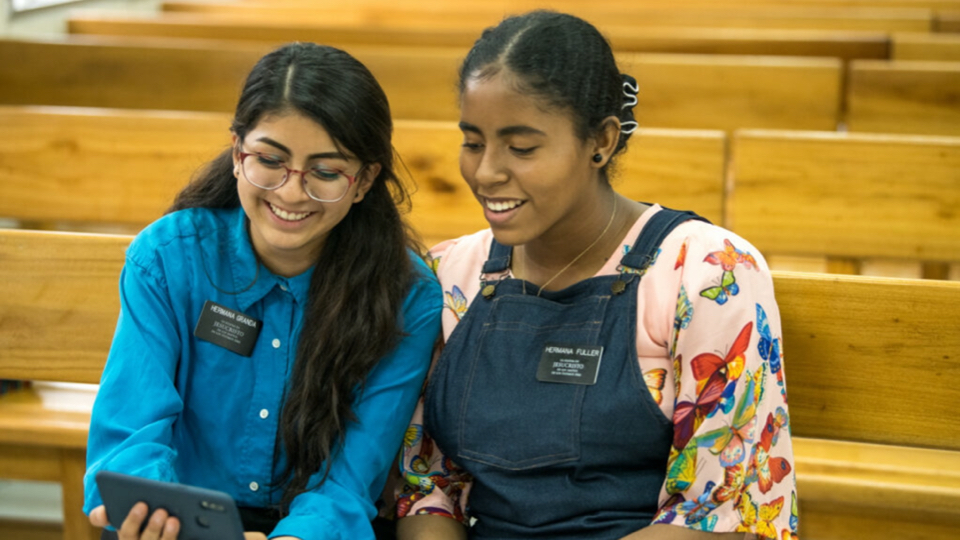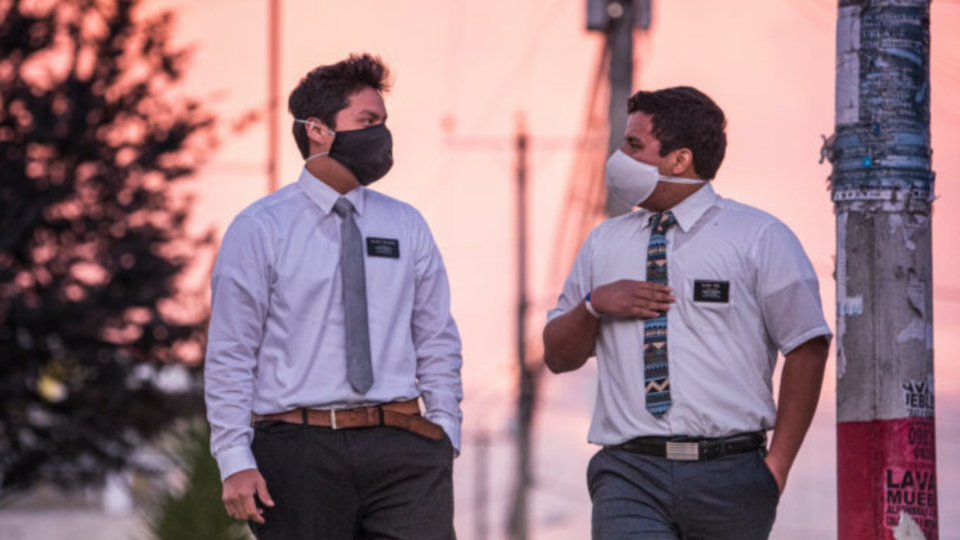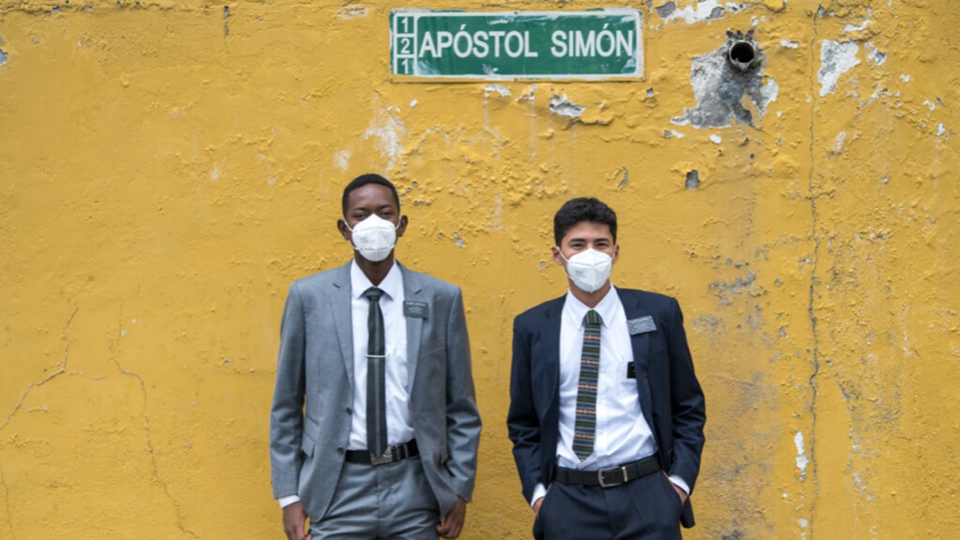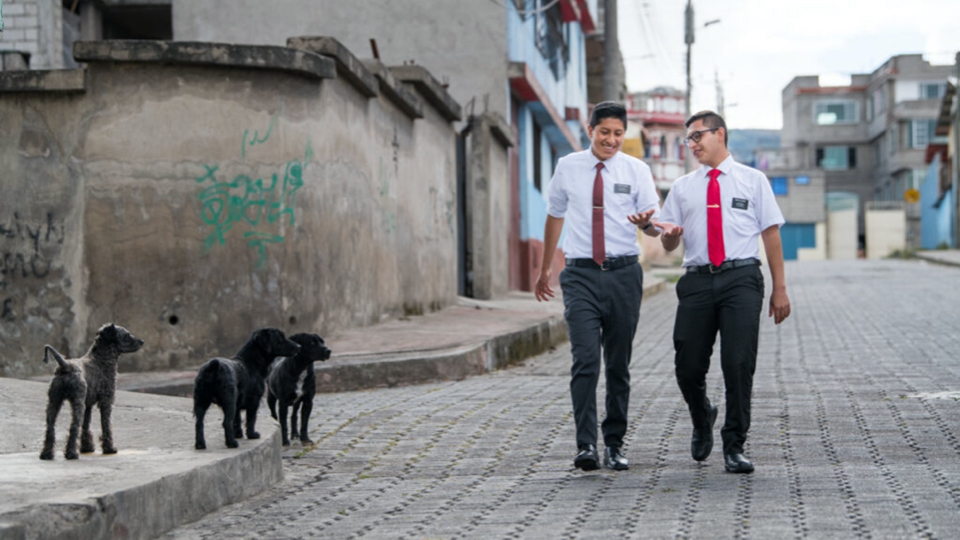
Ecuador Missionary 1
Elder Bismarck Chaparro (left) and Elder Jaime Macias of the Ecuador Quito Mission take a walk in their area in Santo Domingo, Ecuador, during late summer 2020. During the COVID-19 pandemic, they spend most of the day inside teaching online. Photo by David Winters, courtesy of Church News. All rights reserved.This story appears here courtesy of TheChurchNews.com. It is not for use by other media.
By Alyse Murphy Leininger, Contributor
In his October 2020 general conference address, Elder Dieter F. Uchtdorf acknowledged that the current COVID-19 pandemic would seem to be a roadblock to missionary work, with traditional methods of sharing the gospel not possible because of restrictions.
“However, the pandemic is revealing new and more creative ways of reaching out to the honest in heart,” said the member of the Quorum of the Twelve Apostles, who chairs the Church’s Missionary Executive Council. “The work of gathering Israel is increasing in power and enthusiasm. Hundreds and thousands of stories attest to this. … Many of our missionaries are busier than ever. Many are teaching more people than ever. There is an increased connection between members and missionaries.”
In Quito, Ecuador, missionary work is moving in a different way and at a pace that affirm Elder Uchtdorf’s statements.
Some might not recognize everything current missionaries are doing as “missionary work.” Gone are knocking doors and contacting people on streets or in buses. And yet, new methods have been successful.
In August 2020, the Ecuador Quito Mission and the Ecuador Quito North Mission totaled more convert baptisms — in the middle of a pandemic — than the two missions had the previous August. And this same increase in teaching and baptisms is expected going forward.
“We have friends and family who probably wonder what missionary work looks like during a worldwide pandemic,” said President David Winters of the Ecuador Quito Mission. “My one-word description for it is ‘miraculous.’”
‘New and More Creative’ Missionary Work
Ecuador was hit especially hard by COVID-19 in the early spread of the pandemic, and the entire country went on lockdown for a time. Nearly all nonnative missionaries were initially sent home, and those missionaries who remained were not allowed to leave their apartments for anything except to purchase food.
Missionaries still had basic cell-phone service, but without Internet access, meaning they couldn’t use WhatsApp or social media for communication. “Back in May, missionary work was at a standstill because of the quarantines in effect and because the missionaries didn’t really have a way to share the gospel,” President Winters said.

Ecuador Missionary 2
Sister Angie Granda (left) and Sister Andrea Fuller of the Ecuador Quito Mission teach an online lesson in Baños, Ecuador, in October 2020. The Ecuador Quito Mission received smartphones in May. Photo by David Winters, courtesy of Church News. All rights reserved.This all changed in May when the two Quito missions received smartphones and missionaries adapted rapidly to an entirely new method of missionary work using social media and smartphones.
“In the past, we might have been so tied to traditional approaches that it took a pandemic to open our eyes,” said Elder Uchtdorf in his conference address. “Of necessity, we are now learning how to use a variety of methods, including technology, to invite people — in normal and natural ways — to come and see, come and help, and come and belong” (“God Will Do Something Unimaginable,” October 2020 general conference).
The COVID-19 restrictions in Ecuador have loosened a little since the pandemic’s spring surge. Missionaries are currently only allowed to teach in someone’s home or in a meetinghouse when someone invites them to teach there. As a result, all efforts in finding people to teach have to happen online.
Increased Media Referrals
With online and social media work taking root, supplemental efforts have been added, including the placement of Facebook ads and a local initiative involving ads on Google and YouTube. Within hours of the first ads being released, missionaries had multiple people requesting to be taught — eventually they were inundated with media referrals.
The increased number of referrals received at the Ecuador Quito Mission Office resulted in missionaries in some areas struggling to keep up with the requests. “Responding to all the people who are interested in the gospel is not easy at all,” said Elder Carlos Bolaños, the mission’s referral secretary.
The Quito mission has developed a new system to respond to all messages and comments coming via the mission’s social media avenues. Several companionships have received assignments — five-hour shifts to call those who have requested meetings with missionaries.
One man saw a local Facebook ad and felt compelled to ask for more information. The sister missionaries quickly called him and taught him for three weeks through WhatsApp video calls — overcoming some technological difficulties to sustain the virtual lessons.
Although not taught in person, the man felt the Spirit testifying to him to make changes in his life. Learning of the Word of Wisdom, he immediately committed to stop drinking coffee; learning about fasting, he promptly started a three-day fast as part of his desire to repent.

Ecuador Missionary 3
Elder Alex Blacio (left) and Elder Roger Ron of the Ecuador Quito Mission take a walk in their area in Ambato, Ecuador, during late summer 2020. During the COVID-19 pandemic, they spend most of the day inside teaching online. Photo by David Winters, courtesy of Church News. All rights reserved.Baptized at the end of September, the man continues to participate in virtual lessons with the missionaries and has begun attending virtual Sunday meetings and blessing the sacrament in his home each week. Even with a conversion that happened almost all virtually, he feels personally committed and strongly connected to the gospel.
Elder Mathias Held, a General Authority Seventy and first counselor in the South America Northwest Area presidency, said similar patterns are being repeated throughout the area.
“All of our missions received smartphones, and in this way the missionaries have already been able to share content online, give lessons and use social networks to invite people to come to Christ,” Elder Held said. “Thanks to this, we are able to contact people that we could not reach before. The members are also accompanying the missionary work more closely.”
Member Missionary Work Through Social Media
While ads have increased the number of referrals, they aren’t the most important source of referrals. “The majority of baptisms we have seen have come from member referrals,” President Winters said. “When members and missionaries work together, the results can be miraculous.”
In the Ambato Ecuador Stake, members were determined to advance the work despite the local challenges of the pandemic and the withdrawal of full-time missionaries.
They created a stake social media committee, including social media missionaries to monitor references online and a stake social media account. All of the stake’s recently returned missionaries were called as ward missionaries and assigned to share the gospel online.
Elder Enrique R. Mayorga, an Area Seventy who resides in Otavalo, Ecuador, said of the Ambato stake’s missionary efforts: “From all this we see how people seek to know and learn about God and Jesus Christ. As a result, some people have already been baptized and others continue to hear the gospel of salvation.”
Technology Within the Mission
Technology also benefits the missionaries in working behind the scenes and with each other. For example, President Winters and his companion in the Quito mission, Sister Pamela Winters, can use Zoom and other videoconferencing apps to spend more time with missionaries living far from the mission office, rather than wait for periodic zone conferences or companionship interviews.

Ecuador Missionary 4
Elder Luis Castillo (left) and Elder Isaac Escalante of the Ecuador Quito Mission pose in front of the Ecuador Quito Mission pose in front of a wall while taking a walk in their area in Quito, Ecuador, in late summer 2020. Photo by David Winters, courtesy of Church News. All rights reserved.“Technology has been a great blessing to our mission, enabling us to be in constant contact with our missionaries,” said Sister Winters, specifically noting her interactions with sister missionaries. “It is such a joy to join in on companionship study and be a part of their planning sessions. I have been able to better get to know the sisters and share my testimony with them, all done remotely.”
President Winters added his appreciation in being able to hold more frequent, brief devotionals with the entire mission through videoconferencing.
Not Easier, Not Harder — Just Different
In speaking to missionaries in the Ecuador Quito Mission, Elder David A. Benalcázar, an Area Seventy from Quito, addressed the changed methods of missionary work resulting from pandemic-period efforts.
“What you must understand is that the mission at this time is not neither easier nor more difficult than before. It is simply different,” he said. “Different in the way it is preached, but at all times, whether it be now or tomorrow, the Lord’s promise is that it will always be possible.”

Ecuador Missionary 5
Elder Milton Casco (left) and Elder Kevin Álvarez of the Ecuador Quito Mission take a walk in their area in Quito, Ecuador, during late summer 2020. During the COVID-19 pandemic, they spend most of the day inside teaching online. Photo by David Winters, courtesy of Church News. All rights reserved.President Jorge Chacón of the Ecuador Quito North Mission said, “Our missionaries continue to work at the same pace, encouragement and dedication as in times past. The results are miracles.”
In the October 2020 general conference, President Russell M. Nelson testified, “The Lord is gathering those who are willing to let God prevail in their lives. The Lord is gathering those who will choose to let God be the most important influence in their lives. For centuries, prophets have foretold this gathering, and it is happening right now” (“Let God Prevail”).
Missionaries today provide a crucial role in the gathering of Israel, President Winters said. “We are still not allowed to knock on others’ doors to share the gospel, but now, people are knocking on our doors. … We are gathering Israel. We are finding people who have a genuine desire to ‘let God prevail’ in their lives.”
Added President Chacon: “These different times have given us the opportunity to witness miracles occurring daily in front of our eyes, not only in the lives of the people we serve but in our own.”
Copyright 2020 Deseret News Publishing Company